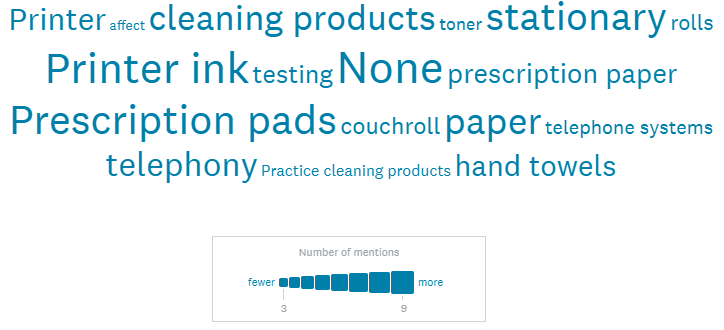EU Exit Planning: Non-Clinical Goods and Services
![]() Thank you for responding to our recent survey on practice needs in the event of a no-deal Brexit. We rely on your input.
Thank you for responding to our recent survey on practice needs in the event of a no-deal Brexit. We rely on your input.
Following a discussion at our Annual General Meeting on Thursday 24 January, we asked you about the impact of a no-deal EU exit on your practice-critical Non-Clinical Goods and Services (NCGS). Medical devices, clinical consumables and medicines are being considered separately.
We asked you to consider:
- The dependency of those goods/ services on that front-line service;
- The criticality of that front-line service and its clinical importance; and
- Outsourced services such as equipment maintenance.
We had a really good response and have been able to advise officials about supply concerns across London in good time. Whilst there were a number of respondents who are unconcerned about the impact of no-deal Brexit, those who do harbour concerns highlighted a number of non clinical products and services which they fear might be affected. These include:
- Stationary;
- Printer ink;
- Prescription pads;
- Couch roll;
- Paper;
- Telephony;
- Cleaning products;
- Prescription paper;
- Printer;
- Hand towels;
- Testing;
- Telephone systems;
- Practice cleaning products; and
- Toner.
We will continue to work with officials to identify and anticipate the impact of Brexit on London general practice, be it no-deal or otherwise. Other possible EU exit risks include:
- Goods or services that have supply chain touch points in the EU;
- Personal data held in EU member countries;
- Supply routes into the UK via Dover/ Calais; and
- Dependencies on EU regulations.
If you have any comments or questions about this work, please contact us.
This word cloud gives some indication of respondents' concerns.

Tips of the month October 2019 (22 Oct 2019)
We provide weekly tips based on common queries which come through to us from London GPs and practice teams. These are shared via social media and collated for...Digital-first update - October 2019 (22 Oct 2019)
At the end of September NHS England’s board agreed proposals put forward following its most recent digital-first consultation. The NHS England board paper on digital-first recommendations can be viewed...BMA PCSE surveys closing 25 October (21 Oct 2019)
The BMA surveys of GP practices and of GPs are closing on Friday 25 October. They are designed to collect information on the problems encountered with Primary Care Support England, the...The revised Notification of Deaths Regulations (2019) (21 Oct 2019)
The Notification of Deaths Regulations (2019) came into force on 1 October 2019, a link to the associated Statutory Instrument can be found here and the Ministry of Justice’s...Preparing for Brexit with MidMeds (14 Oct 2019)
With growing uncertainty about the impacts of Brexit on London general practice, we know that some practices are thinking about stockpiling essential supplies. The Londonwide Buying Group's recommended medical supplies...Buying Group newsletter - October 2019 (14 Oct 2019)
Initial training for cervical sample takers - book your place now (04 Oct 2019)
Initial...Tips for covering sexual health in consultations (18 Sep 2019)
Kirsty Armstrong is an Advanced Nurse Practitioner in Out of Hours, Primary and Urgent Care and a Lecturer in Primary and Urgent Care, along with leading our Sexual Health Update...Becoming more dementia friendly for World Alzheimer’s Day (18 Sep 2019)
21 September is World Alzheimer’s Day, when individuals and organisations are encouraged to take steps to become more dementia friendly in their day-to-day lives. The more people understand about dementia,...Dr Nikki Kanani appointed Director of Primary Care for NHS England and NHS Improvement (18 Sep 2019)
Congratulations to Dr Nikki Kanani, a Bexley GP, on becoming Director of Primary Care for NHS England and NHS Improvement. At the start of September, NHSE/I confirmed her role as...Guidance
We provide expert guidance for practices in our guidance section, as well as an archive of other materials you may find useful.
GP Support
Contact our GP Support team if you need help or advice.
The team provide professional and pastoral support to GPs and practice teams on a broad range of issues.

